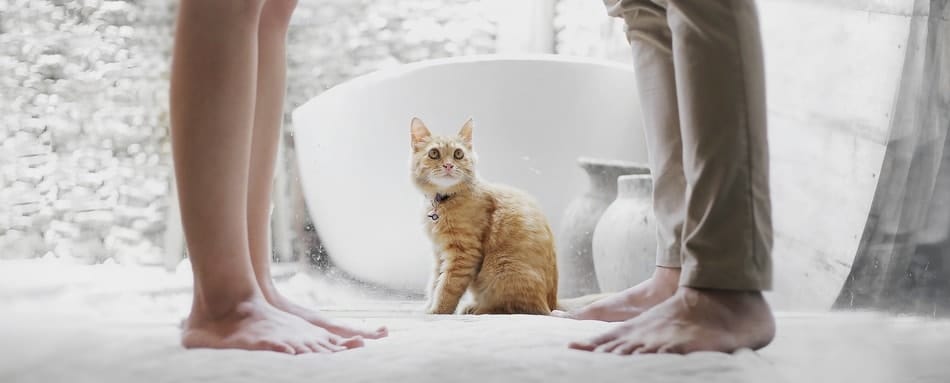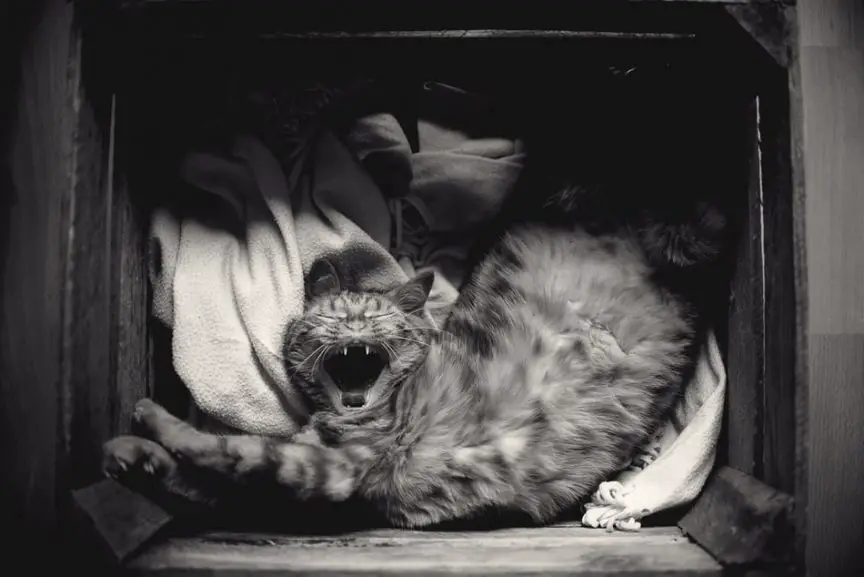
Lately in my research on how air purifiers can help improve indoor air quality I came across some complaints by cat owners in a number of online forums about how dust from their cat litter boxes is polluting their home and causing them nightmares.
In desperate search for a solution some people asked whether air purifiers can help get rid of cat litter dust. Here is what I found.Can air purifiers get rid of cat litter dust? Cat litter dust particles range upward of 0.2 microns in size while most air purifiers can remove dust and particulates that are as small as 0.1 microns. Air purifiers can thereby help minimize cat litter dust as long as they are specified to remove air particles that are smaller than 0.2 microns.There are of course other ways to getting rid of cat litter dust but if you decide to go the air purifier route the trick is to find an air purifier that at minimum captures particles that are smaller than cat litter dust particles.
So this means that when you are choosing your purifier, make sure the specifications show you that it can capture particles of 0.2 microns. That said if you find an air purifier that can capture particles that are smaller than 0.2 microns then this is perfect for getting rid of airborne cat litter dust. The rule of thumb is, the smaller the microns the cleaner the purifier will make your air. Just in case you are wondering, you can find the information on the particle size of pollutants an air purifier can effectively filter on the product specification section of the website or packaging of the air purifier. So be sure to go through the specification section in detail before you get one.
Next I am going to explain to you what kind of air purifier you should get for cat litter dust and also everything you should consider if you decide to an air purifier.
What kind of air purifier will work best for cat litter dust?
Besides particle sizes, you also need to consider the different types of air purifiers, the size of the room you want to put your air purifier in and the level of noise you and your cats can tolerate from such a device.
These factors will determine how well the air purifier you choose will get rid of the dust and how much you will need to fork out to get rid of the mess the dust is making in your home.
There are many types of air purifiers out there but the two main types I have found will work best for cat litter dust are ionizers or high-quality HEPA air purifier. Ionizers work by releasing negatively charged ions into the air and these attach onto positively charged pollutants in the air.
Once the particles are attached to negative ions the particles become charged and too heavy to stay in the air and eventually fall to the ground or are further attracted to iron plates in the purifier depending on what kind of purifier you get.
Though ionizers don’t have filters that you need to constantly replace and are known for operating silently, they can actually cause ozone in your house. Ozone is good at killing germs but it’s bad for your lungs and if you are not careful, running an ionizer indoors can cause ozone to accumulate to dangerous levels in your home.
Scientists state that little traces of it in your air can over time flare up respiratory problems for both you and your cat especially if you have preexisting conditions like asthma.
Also, if you get an ionizer without collection plates or a fan to suck the charged particles out of the air, the particles settle on surfaces, living a thin film of dust which defeats the purpose if you are trying to get rid of cat litter dust. Ionizers without fans, also fail to catch airborne particles from more than a few feet away.
To add on, some ionizer comes with plates that get covered with collected particles in just a few hours and you have to constantly clean the plates cause once they are covered the plates inside lose their power to attract pollutants and the purifier stops operating effectively.
Considering the various shortcomings of ionizers, I personally would rather go for a HEPA air purifier even though you have to change filters regularly. Unlike ionizers, the ultra-fine mesh filters in HEPA air purifiers trap everything that goes through them and you won’t have dust from your cat litter box settling on surfaces around your house.
HEPA air purifiers work by sucking air through a sieve or filter that traps particles and the type of particles that get trapped depend on how small the sieve holes are. So the smaller the sieve, the more particles you can trap. Most HEPA air purifiers remove at least 99.97% of 0.3 microns particles and are usually more effective at removing larger particles like dust and dander. They also don’t generate ozone or any by-products that could harm you.
There some awesome air purifiers I found at Amazon that I recommend you check out. A good example of a HEPA air purifier that works well for cat litter dust is the IQ Air Health Pro Plus purifier.
If you want the best of both worlds, you can also try a combo HEPA air purifier like the Blueair Classic 203 Slim HEPASilent purifier which comes with an ionizer. With this type of air purifier, you don’t need to worry about dust being left on surfaces as the HEPA filter sucks it out of the air before it settles. But you still need to be cautious about ozone.
Some HEPA air purifiers also come with concentrated built in UV light in their filter compartment and the UV helps to kill bacteria and germs contained in cat litter dust.
Another great combo HEPA purifier to get is an activated carbon HEPA purifier. This type of air purifier is not only helpful with dust but will also help you deal with your cat litter odor and your pets general odor, killing two birds with one stone
When it comes to room sizes, you need to get rough estimate of the width height and length of the room you would like to put the filter in. To get rid of the litter dust this will obviously be the room where your litter boxes are.
Once you determine the room size then you need to cross check this with the capacity indicated on the air purifier specification. A rule of thumb is to get a purifier that has a slightly larger capacity than the size of your room.
Lastly, let me mention that if you go for the cheaper HEPA air purifiers, they can be rather loud devices. This should not matter so much if your cat litter box is in a laundry room or room where no one really needs peace and quiet and your cats should be ok with the sound as long as the noise is not close to their business.
However if your cats are sensitive to the noise or for whatever reason you need silence in the room with your litter box, you can go for the more expensive type of purifiers that operate almost without a sound.
Should you and your cat really consider an air purifier?
Now that you know that air purifiers can help with cat litter dust, you might be wondering whether they are really worth it or if you should you just try alternative methods.
From my research, I found that having an air purifier is worthwhile. This is because cat litter dust is not only dangerous if you inhale it on its own but even more dangerous when your cat has contaminated it with urine or feces.
Beyond stopping the filth the dust from your cat litter creates, an air purifier alleviates the dangers of inhaling cat litter dust by considerably decreasing the number of pollutant particles it releases in your home and replacing it with clean air.
Depending on the type of litter you are using, it either contains silica or sodium bentonite dust. Clay-based cat litters contain crystalline silica, the main component in sand, rock and mineral ores.
Due to the silica dust particles they release, clay-based litters pose a health threat to both you and your cat. If you are exposed to silica dust for long enough you can catch silicosis, a non-cancerous but sometimes fatal lung disease. What’s more, the silica dust goes into you and your pets’ lungs and causes the formation of scar tissue, and this reduces your lungs’ ability to take in oxygen.
Then, if you are exposed to crystalline silica dust which is a suspected carcinogen, over time you can get bronchitis or tuberculosis. Like silica dust, If you breathe in sodium bentonite dust for long enough, it can also cause silicosis. More commonly though, the sodium bentonite in your cat litter dust causes irritations to your nose and lungs and sneezing and cold-like symptoms in your cats and pets in general.
On its own, cat litter dust can cause various respiratory problems for you and your cat then when its combined with faeces or urine from your cat, the biggest fear is that you can catch Toxoplasma gondii. This is a parasite which can be transmitted to you if you inhale contaminated clay litter dust in the air.
If you catch Toxoplasma gondii you will get toxoplasmosis, which causes headaches, muscle pain, and fever. To make matters worse, if you are pregnant toxoplasmosis, can result in birth defects and your child having problems like blindness or mental disability later in life.
That said, chances of catching toxoplasma through cat litter dust are generally low and highly dependent on whether your cat is infected but it is a risk you should know you are reducing if you get an air purifier.
So given all the possible health risks of inhaling cat litter dust should you consider an air purifier? If I had a cat and I could afford an air purifier, I would definitely get one.
Unless of course, you have an outside area to put your cat litter box but beyond reducing the health risks and getting rid of the dust, I would also get an air purifier because it also gets rid of cat litter odors and cat dander. For me, an air purifier just makes sense for homes with pets roaming around and today you can get air purifiers that are actually specifically designed for pets.

